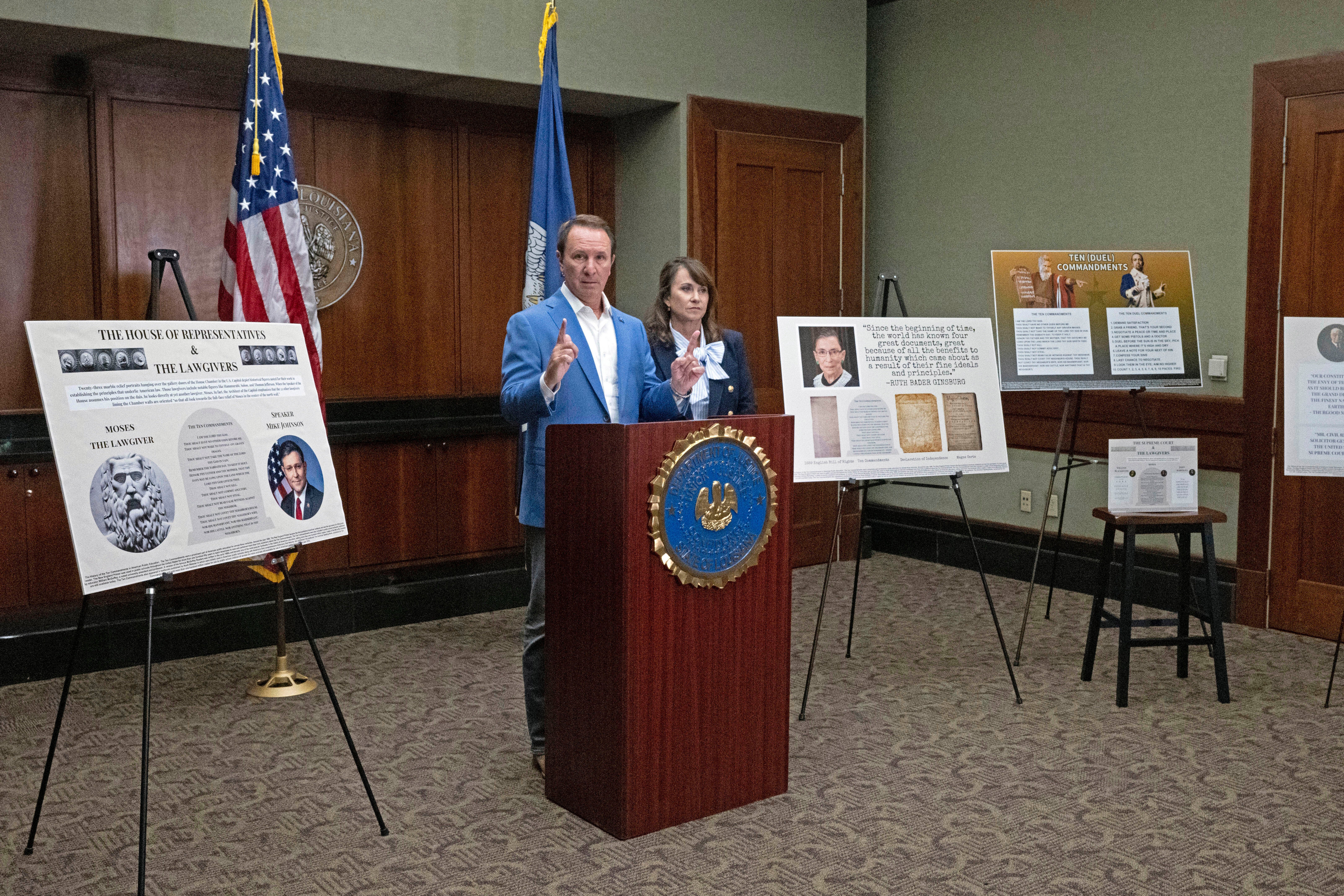A federal judge has struck down a Louisiana law that required every public school and university classroom to display the Ten Commandments, drawing legal challenges from civil rights groups anticipating a Supreme Court battle with the state’s Republican governor.
The law violates the First Amendment’s provisions against the government from establishing or favoring one religion over another, and from interfering with a right to practice a religion without government interference, according to the ruling.
There is a “real and substantial likelihood of coercion” if Louisiana students are forced to be a “captive audience” for “a specific version of the Ten Commandments, one posted in every single classroom,” District Judge John Wheadon deGravelles wrote on Tuesday.
Louisiana officials are blocked from enforcing the law under a temporary injunction that the state will now try to appeal.
The law signed by Governor Jeff Landry earlier this year — the first of its kind in the US — appears to be designed to invite a federal court battle that will work its way to the Supreme Court. Conservative Christian legal groups have been angling for another shot at reversing Supreme Court rulings protecting the separation of church and state for decades.
“We strongly disagree with the court’s decision and will immediately appeal,” Louisiana attorney general Liz Murrill said in a statement. “This decision only binds five of Louisiana’s many school boards. This is far from over.”
The plaintiffs had argued that the law not only flies in the face of First Amendment protections but also “sends the harmful and religiously divisive message that students who do not subscribe to the Ten Commandments — or, more precisely, to the specific version of the Ten Commandments [the law] requires schools to display — do not belong in their own school community and should refrain from expressing any faith practices or beliefs that are not aligned with the state’s religious preferences.”
Landry signed the legislation from a Catholic school auditorium after announcing that he “can’t wait to be sued” by turning Louisiana into the first state to mandate the Ten Commandments in schools.
The law, set to take effect on January 1, requires all schools to display the text exactly as written in the bill, and in “a poster or framed document that is at least eleven inches by fourteen inches” — at minimum — and “in a large, easily readable font.”
It also requires a 200-word “context statement” arguing that the Ten Commandments were “a prominent part of American public education for almost three centuries” up to 50 years ago.
Last year, Louisiana’s GOP-controlled state legislature passed a similar measure that requires “In God We Trust” to be displayed in all public school classrooms.
Republican lawmakers in several other states have also tried to pass similar legislation that would put the Ten Commandments in public classrooms.

In 2005, the Supreme Court ruled that the public display of the Ten Commandments in two Kentucky county courthouses was similarly unconstitutional.
But a Supreme Court ruling in 2022 loosened interpretations of the First Amendment’s establishment clause to allow a high school football coach to pray with his team on the 50-yard line.
Joseph Kennedy claimed that Washington state’s Bremerton School District violated his religious freedom after staff repeatedly asked him to move his prayer to somewhere less conspicuous, as to avoid the appearance of the school’s endorsement of a religious view.
In her dissent in that case, Justice Sonia Sotomayor warned that the Supreme Court “continues to dismantle the wall of separation between church and state that the Framers fought to build.”
A ruling that blocks Louisiana’s law “will ensure that Louisiana families — not politicians or public school officials – get to decide if, when and how their children engage with religion,” according to Rachel Laser, president of Americans United for Separation of Church and State, which joined plaintiffs in the lawsuit.
“It should send a strong message to Christian Nationalists across the country that they cannot impose their beliefs on our nation’s public school children,” she added. “Not on our watch.”
The law is “a direct infringement of our religious-freedom rights, and we’re pleased and relieved that the court ruled in our favor,” according to Unitarian Universalist Minister Darcy Roake, the lead plaintiff in the case.
“As an interfaith family, we expect our children to receive their secular education in public school and their religious education at home and within our faith communities, not from government officials,” she said.







